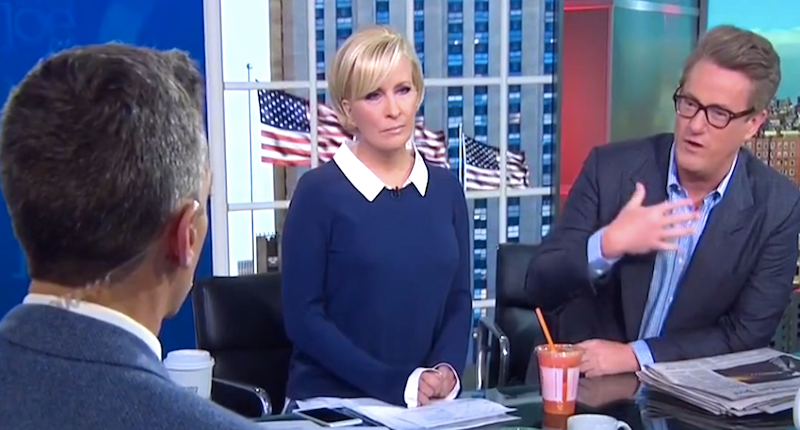Cybersecurity and counterterrorism expert Clint Watts said he was very worried about how the Trump campaign promoted Russian propaganda -- and he suggested the president might still be doing it from the White House.
Watts appeared Friday on MSNBC's "Morning Joe" to discuss his bombshell testimony during the Senate Intelligence Committee hearings, where he described how Donald Trump and his campaign promoted "fake news" that came from Russian propaganda sites.
Host Joe Scarborough said the obsession with Russian interference undermined trust in democratic institutions and seemed to play into Vladimir Putin's hands, but he wondered how much of the operation's success was sheer luck.
"Most of this for the Russians is just dumb luck, that they have stumbled onto a presidential candidate, as you basically said (Thursday), that was stupid enough to fall for their fake news," Scarborough said.
Watts said Russian active measures were intended to sow confusion and cause their enemies to fight amongst themselves -- and they use the same tactics at home.
"It's a duplicate system they use on their own populace, to sow information so their own populace is confused," Watts said.
He urged journalists to examine the accounts that tweet conspiracy theories at the president's personal Twitter account, because he sometimes amplifies those outrageous claims.
"If you look at the accounts, the outlets, these very small fringe outlets that are pushing conspiracies directly at the president, I think you're going to see where a lot of that influence comes from," Watts said. "It's not just the Russians -- others trying to influence it, as well. They know they can get into his decision cycle with any conspiracy that he'll bite on. If they put out conspiracy very personal to his ego, such as the Trump Tower wiretapping claim, then you've got the potential he'll fall for a conspiracy. We've seen it happen before."
Co-host Mika Brzezinski was astonished by Watts' claims.
"Wow," she said. "That's sad."
Watts said he wasn't certain of collusion between the Trump campaign and Russia, but there was certainly a connection.
"There's two ways to look at how Russian active measures get propelled amongst the Trump campaign," Watts explained. "Is it coordination and synchronization? At times we saw people on Twitter say, 'Hey, I've talked to Guccifer (who has been identified by U.S. intelligence as a Russian hacker), I've talked to WikiLeaks and they've got something coming out.' To me, that's collusion."
Roger Stone, a longtime Trump associate who briefly worked for his campaign in its early days, has admitted to contacting the hacker and has claimed to have "back-channel" contacts with WikiLeaks founder Julian Assange.
"The other part is opportunism, which is also stranger," Watts continued. "Why would you look at Russian propaganda to go against your American opponent? That's crazy, especially coming from a Republican candidate. Looking back to the Reagan era, this was the party tough on the Soviet Union, tough on Russia, and we've a candidate -- now president -- siding with Russia to go against an opponent. Either scenario is scary, (but) I think collusion is the worst place, obviously."
Watts said he believes the Obama administration didn't push back more aggressively against Russian interference because they misunderstood what was happening.
"They did not understand the purpose of the hacking was to influence the campaign and arm Russian propaganda so they could influence the campaign," Watts said. "I think that's the first time they've ever seen it, and there's a disjointed nature in our government between the FBI's investigation and what the implications would be from an intelligence standpoint. I think now they understand it. When it happened back (in) July, August of last year, they didn't know how to react and, therefore, were slow and didn't do anything."
He said the U.S. had been too concerned with overseas terrorism, which allowed security and intelligence agencies to overlook why Russia or other foreign actors would want to hack into the American political system.
"We always thought it was compromised information to steal bank account information," Watts said. "Nobody was really focused on why would they want this. There was a gap -- I don't think it's the FBI's fault -- but who covers down on Russian influence? That's the intel agencies, and is there that synchronization between law enforcement and intel."
Leave a Comment
Related Post
